#on serious note i like that comics make a point about bravery of leaving mother
Text


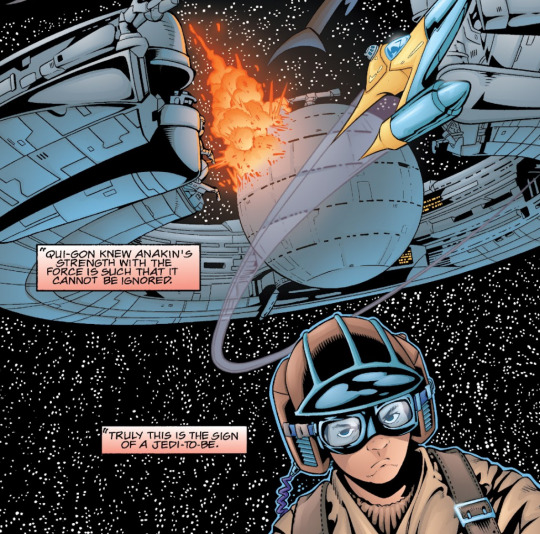
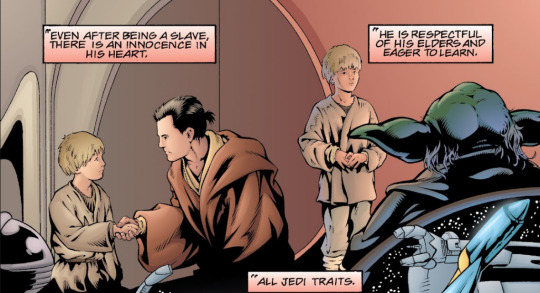
[Star Wars: Episode I - Obi Wan Kenobi]
#star wars#obi wan kenobi#anakin skywalker#anakin at age of ~10 showed compassion bravery eagerness to learn and respect to elders but#all the jedi traits#and then he was trained in Yoda's Jedi Order and he ended as a sith lord#not saying anything but...#on serious note i like that comics make a point about bravery of leaving mother#to travel far away and meet unknown jedi masters#and then jedi are uh uh you miss your mom so bad#heh
125 notes
·
View notes
Text
188. Sonic the Hedgehog #120
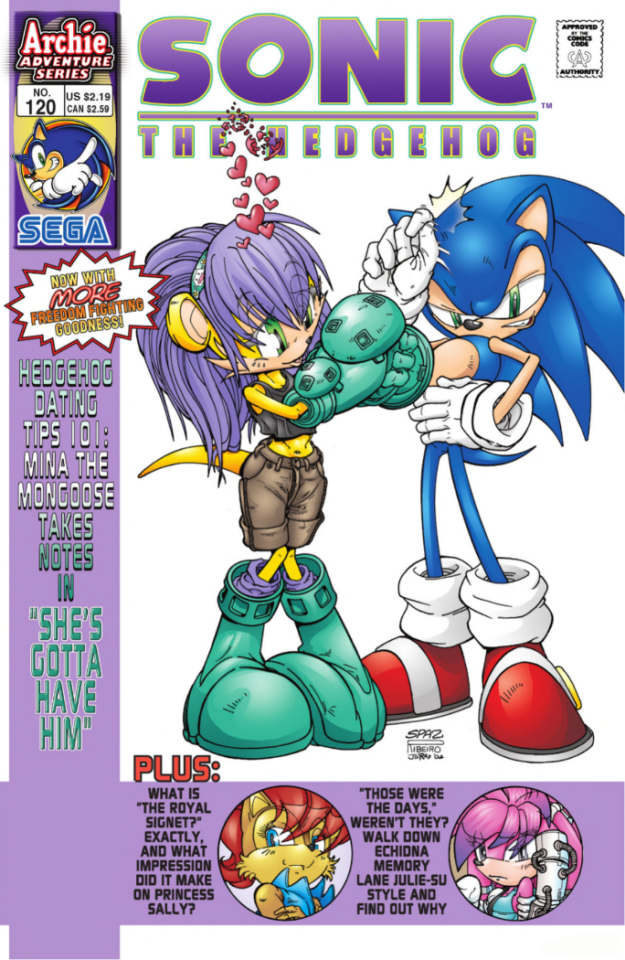
She's Gotta Have Him
Writer: Karl Bollers
Pencils: Steven Butler
Colors: Jensen
Mina's crush on Sonic hasn't abated one bit. If anything, time has only made it stronger, but she's still struggling to find a way to get him to notice her. She asks her mother, who by now has moved back in with her since regaining her right mind, for advice on how to attract a guy, and her mother tells her the story of how during the Great War her father saw her running away from a group of enemies and jumped in to protect her. Interestingly, the father clearly isn't around anymore, implying that he must have died at some point in Mina's early childhood - as far as I recall he's never actually mentioned again. Mina takes this thought to the bathroom and begins formulating a plan to get Sonic's attention while singing her heart out in the shower, coming out with the idea that she should dress up for him.
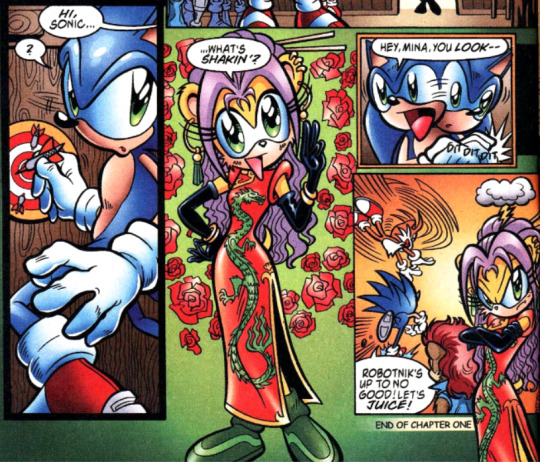
Ah, yeah. Knothole is now under much greater threat than before now that Eggman remembers its location, you see, which means the Freedom Fighters are a lot more busy than usual. Mina thus decides that the real best way to get Sonic's attention is to join the Freedom Fighters herself, citing her natural speed as a suitable ability to bring to the table. Sally, of course, isn't about to accept anyone into the group's ranks that can't hold their own in a tough situation, and so she mandates that Mina must go through some serious training before she can become an official member.
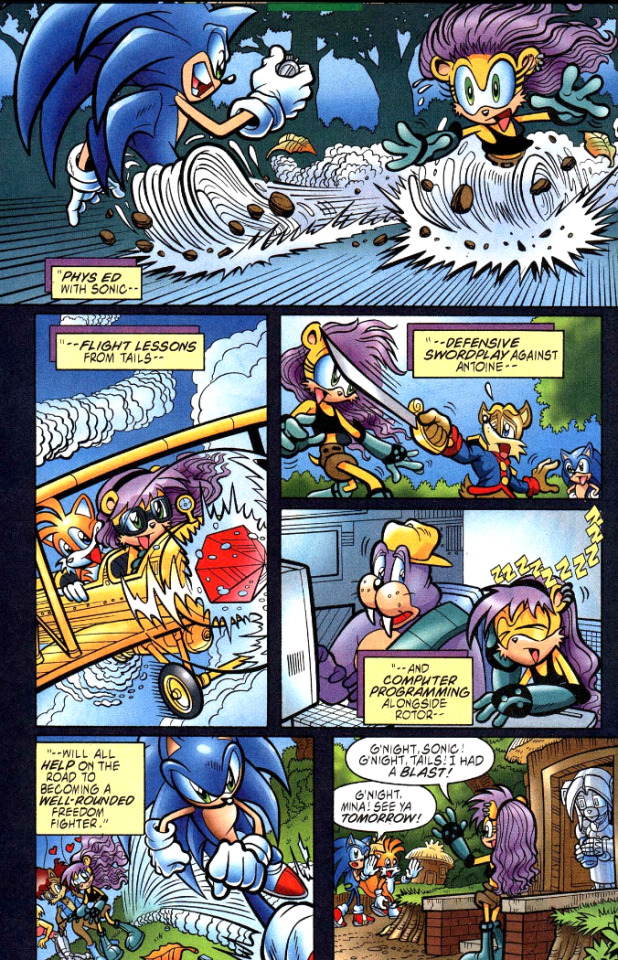
That night she gushes to her mother about her experiences, but her mother finds herself quietly worried for her safety, knowing what Mina's true motives are. The next morning before Mina begins her training, her mother has a private word with Sonic about how much Mina looks up to him and asks him to keep a close eye on her, but before he can respond, loud thundering footsteps outside the village alert everyone to the approach of a giant robot, ready to stomp Knothole into dust. Mina finds herself growing nervous, unsure of how to help, but rushes in anyway, thinking of her father's bravery. Rosie's young charges run to her in fear, having lost their way in the chaos, and she tries to comfort them, only to turn and see the robot heading straight for them all.
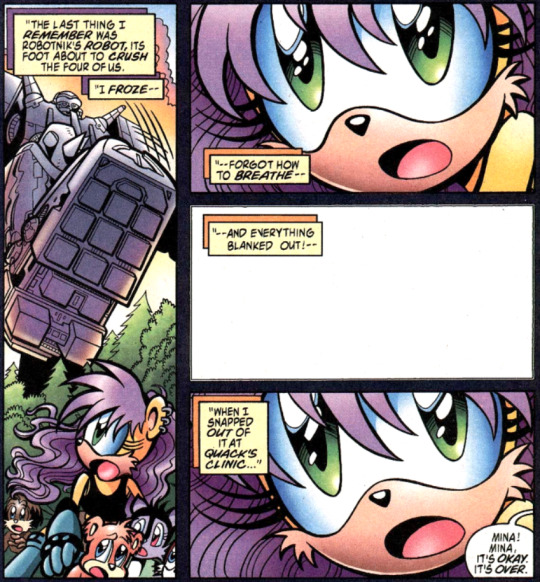
And that was how Mina Mongoose died. Nah, of course she's okay - the Freedom Fighters defeated the robot before it stepped on her - but the whole experience makes her realize that she was trying to become a hero for all the wrong reasons, and so she willingly gives it up, even knowing that she can't use it as an excuse to gain Sonic's attention anymore. She takes a bath to cheer up while Sonic and Tails happen to walk past her window. They're actually quite understanding, which I find sweet - no one blames her for freezing in the face of danger, merely noting that not everyone is cut out to face such a situation head on, this obviously being the reason why Sally vets her new recruits so strictly. However, while walking past her house, Sonic overhears Mina singing and is astonished at how good her voice is, even opting to stay nearby for a while longer to listen. Hmmm…
Those Were the Days
Writer: Ken Penders
Pencils: Dawn Best
Colors: Jensen
Julie-Su is sitting at the same docks where she first kissed Knuckles' cheek all that time ago, lost in thought, when Mighty comes to join her. She's deeply contemplative in the wake of losing her boyfriend, and asks Mighty to tell her some things about Knuckles that she never knew before, as he was a very private person in general. Mighty elects to tell her about the day he and Knuckles first met, right after Sonic helped him escape Robotnik's prison camp when he was ten years old.
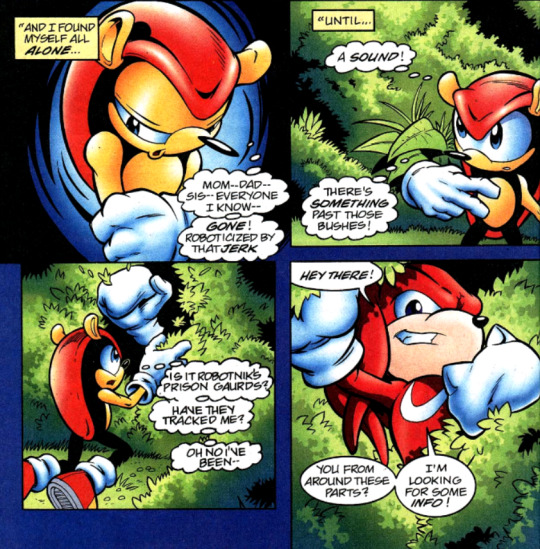
Knuckles was looking for a way back to the Floating Island after leaving it to explore, having lost Vector somewhere along the way, and asked Mighty for directions. Of course, Mighty had no idea where he was, and so was of no help. He informed Knuckles that he had just escaped Robotnik's prison camp and lost his entire family to roboticization, and though Knuckles really had no idea what he was talking about, not being aware of Robotnik's takeover at the time due to the remote nature of the island, was sympathetic anyway.
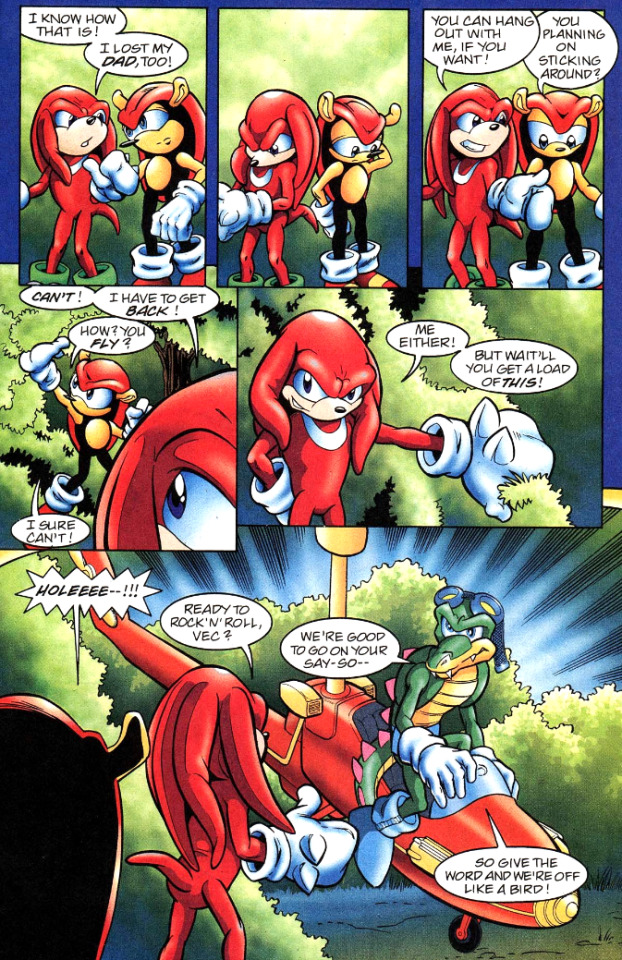
Keep in mind that this is when they were both ten years old, meaning that Knuckles had lost his father at the most just a few months ago, so he would definitely understand Mighty's pain at the time. Mighty accompanied the two back to the island, and though he never ultimately found out what happened to his parents and sister, he found a good group of friends in Knuckles and the other Chaotix members. He is of course sad about losing Knuckles in the showdown against Mammoth Mogul, but he's comforted knowing that he still has the other Chaotix members and Julie-Su to stand by him. This comforts Julie-Su as well, and together she and Mighty watch the sunset from the docks.
The Royal Signet
Writer: Romy Chacon
Pencils: Art Mawhinney
Colors: Jensen
Sally has been happy to spend more time with her mother lately, hoping to catch up on the time they've lost. They're spending a nice afternoon together picking some flowers, and when Alicia catches a chill Sally offers up her vest to make sure she doesn't get cold, as apparently the queen is recovering from a mild illness. The queen feels something in the pocket of the jacket, and pulls out a golden signet ring, recognizing it immediately.
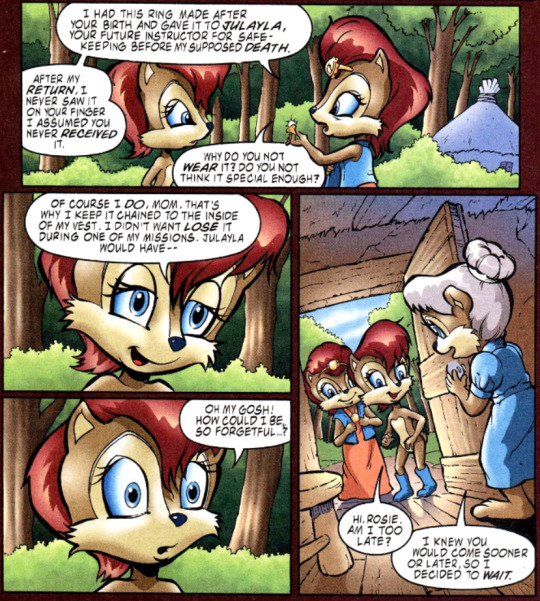
Sally had almost forgotten that today is Julayla's birthday, and she, her mother, and Rosie all head out to Julayla's grave to pay their respects. Sally recalls being there at Julayla's deathbed, and how Julayla gave her the signet ring back then after testing her with the ceremonial acorn (if you'll recall, allllll the way back in StH#18).
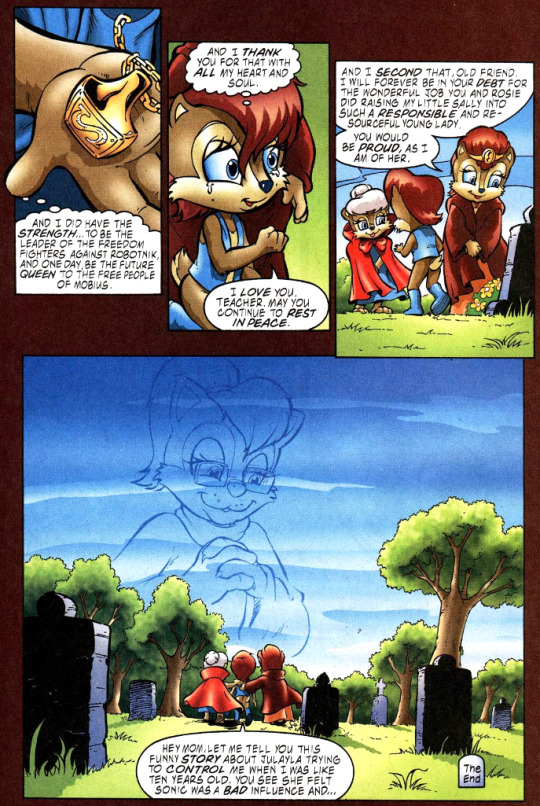
It's really nice to see that despite Julayla being an extremely minor character who literally died of old age in her very first appearance, the comic still remembers her and has the members of the royal family pay their respects appropriately. After all, Julayla obviously played a very important role in Sally's upbringing, something which the queen is very grateful for, and she did seem like a genuinely good character in her few appearances.
#nala reads archie sonic preboot#archie sonic#archie sonic preboot#sonic the hedgehog#sth 120#writer: karl bollers#writer: romy chacon#pencils: steven butler#pencils: dawn best#pencils: art mawhinney#colors: jason jensen
6 notes
·
View notes
Text
Archetype’s Great Choose Your Own Villain Adventure
You’ve finally done it — you have written an amazing hero.
She has all of your own best traits: kindness, bravery, stubbornness, cute glasses. You don’t know if you want to be her or marry her. Readers will see themselves in her and dress to match her style. Critics will fear her. And best of all, she is wholly, undeniably, ready carrying the weight of your complex plot.
But now you need to craft your antagonist. And this fellow really needs to measure up.
Don’t worry, though—in this post, we’ll break down some of the many tools you can turn to when creating someone to foil your protagonist’s plans.
Just how bad is bad?
A. An Evil Villain?
This villain has no morals, or if she does, she buried them deep down a long time ago. She’ll sacrifice her family, friends, and everyone’s free will for eternal beauty, unlimited power, or world domination. Think the Evil Queen from Snow White or Sauron from Lord of the Rings.
B. A Disgruntled Opponent?
This villain's had a lifelong streak of bad luck. His parents were killed by someone eerily similar to the hero, global warming flooded his lair last week, and the hero spilled coffee on his pants while saving a cat from a tree this morning. Really, all he wants is a nap—if he has to chain up a few good guys for some peace and quiet, it’s no more than he deserves. Think Luke Castellan from the Percy Jackson series.
C. A Good Person with Questionable Goals?
Rational people presented with the same situation won’t always agree, because at the end of the day all people, even equally good people, have different values and morals. If your hero wants to flip the switch and save five people on the train track but your antagonist doesn’t think the one man on the other side should die, you’re probably going for this dynamic. This is Captain America: Civil War through and through.
Just how serious are they?
A. Funny and exaggerated?
A villain like this is there to put a wrench in your hero’s plans (and probably provide lots of comic relief), but not seriously threaten anyone with bodily harm. They may think they’re irredeemable and say they couldn’t care less about another person, but they’re either confused or wildly incompetent. Think about it: nobody believes Dr. Doofenshmirtz is going to do anything more than mildly inconvenience them.
B. Menacing and exaggerated?
Your villain shoots lasers out of their eyes. Their knuckles are embedded with knives. One whiff of their breath causes paralysis. One word from their mouth has civilians leaping off cliffs. They wear only black, and their evil lair says “Evil Lair” on the front door. They also probably have a lot of henchpeople. Basically, everything about them screams Bad Guy, to the point where it’s definitely not realistic. A good example is Gru from Despicable Me.
C. Spookily realistic to the point of goosebumps?
The world is a scary place, and sometimes it’s important to represent that in your work. Antagonists can be made all the worse by the fact that they’re just regular people doing reprehensible, unforgivable things. Think Frollo in Hunchback of Notre Dame or Mother Gothel in Tangled—attempted sexual assault and child abuse are no joke.
Was your antagonist …
A. Brought into being because of the actions of your hero?
Some villains might have been a cashier down at the 7-Eleven if it wasn’t for that chance encounter with your hero all those years ago. Now, though, they’ve sworn to get revenge for their slighted pride—stupid heroes and their ego, right? Buddy Pine, AKA Syndrome from The Incredibles, is a great example of this.
B. Morally transformed by a dramatic life event?
Sometimes good people do bad things when they’re under a lot of stress, especially if they’ve been traumatized. Have they been forced to make an impossible choice with consequences that haunt them? Tortured because they were good? Watched their family die? Depending on who you ask, the Punisher falls into this category.
C. Doing the wrong thing for the right reasons?
Sure, your antagonist stole the diamonds and fired a warning shot at the reception outside the gala, but the real baddie is holding her wife hostage at home. Your hero would have done the same thing—right? Think the origin story of the Hook-Handed Man from A Series of Unfortunate Events, or Killmonger from Black Panther.
On a related note, does your antagonist …
A. Have a history with your hero?
In many cases, the protagonist and the antagonist go way back. Maybe they were once friends (this has tons of potential—do they know each other’s weaknesses? Have certain pet peeves they’ve sworn never to exploit?), or maybe they’ve just fought about this issue many times before. Have they dated? Were their parents friends? Think Catra from Netflix’s She-Ra reboot.
B. Fear your hero’s reputation?
This antagonist knows your hero is coming, and as much as he tries to deny it, he knows he’s not ready. Maybe there’s a prophecy. Maybe the hero just has a really good PR team. Either way, the villain is going to try to shoot first—and if he misses, he probably won’t get another chance. Voldemort.
C. Have no interest in your hero whatsoever — the hero wants to stop them, but they don’t think the hero is a threat.
There’s always a chance, though, that your villain doesn’t even think your hero is worth the time of day. Maybe they’ve heard of him, maybe they haven’t—what does it matter when they’re not going to be stopped either way? This villain feels toward your hero what Irene Adler feels toward Sherlock Holmes—totally unbothered, and maybe occasionally amused.
Other fun questions to ask:
Do they have a sidekick? Why does that sidekick serve them?
Do they have an accent? Is it real or for effect?
Do they have powers? Do they wish they did?
Do they have a color scheme?
Does something dramatic happen every time they come into the room (lightning strikes, mirrors crack, a woman screams, etc.)
If left in the room with a wailing baby, how would they handle it?
If left in the room with a barking dog, would they handle that differently?
What are they afraid of?
Things to be cautious of:
Excusing appalling behavior via redemption.
Some things are just inexcusable—or at least, they should be, if we don’t want to contribute to the negative energy out there in the world. So ask yourself … has your antagonist beaten their wife? Sexually abused someone? Harmed children? Acted extremely racist? Gleefully supported fascism? Brutally killed their own father in cold blood?
If you answered yes to any of these questions, think really carefully before planning a redemption arc.
If you want your villain to turn to the good side by the end, they can still do villainous things. They can lie, they can betray those who are close to them, they can plot world domination, they can even kill. But there are lines you probably can’t let them cross if you don’t want them to be hated by your other characters for all eternity. Let’s put it this way—Aladdin, whose worst crime is stealing bread, is redeemable. Loki, who was supposedly being mind-controlled during the first Avengers film, is questionable. Hannibal Lecter, who eats people, is a lost cause.
A really, really phenomenal example of a villain doing sometimes-okay things and yet not being excused for his misdeeds is Count Olaf from A Series of Unfortunate Events—both the books and the Netflix series. There are genuine, emotional reasons he’s a terrible person, and he even does halfway decent things every once in a while. And yet, he’s not forgiven by the characters or the narrative, and he’s treated as the villain he is until the bitter end. Actually, A Series of Unfortunate Events is great at this all around:
Charles: You have to understand, he had a very terrible childhood.
Klaus: I understand. I’m having a very terrible childhood right now.
A less great example is Severus Snape from Harry Potter. When it’s revealed that he loved Lily and occasionally didn’t have it out for Harry by the very end of Deathly Hallows, it’s like the narrative wants us to forget about his bullying, bigotry, attempted genocide, child abuse, pet-murdering, deception, and every other foul thing he gets up to for thousands of pages.
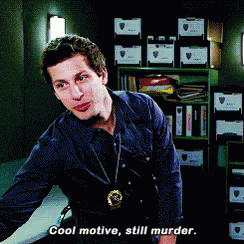
Queer coding. There’s this thing Disney does that you might be familiar with. Let’s pick a few examples and see if you can pinpoint it.
Simba vs. Scar
Hercules vs. Hades
John Smith vs. Governor Ratcliffe
Ariel vs. Ursula
That’s right—male villains tend to be more effeminate and delicate than their tough heroic counterparts, and female villains are hell-bent on corrupting sweet, innocent princesses. Even if the characters themselves aren’t meant to be read as gay—even if they don’t appear gay at all, aside from the coded traits—there’s a history of this being used to reinforce negative stereotypes.
That’s not to say that you can’t have gay villains—make everyone LGBT+, if you want. Goodness knows there are enough straight characters out there to last several lifetimes. But if only the villains are gay, and all the heroes are straight, you’re getting into the dangerous territory of suggesting that the traits that villains have are traits that only gay people have, and vice versa.
The same thing applies to race—if all your antagonists are black or Asian or Jewish or Romani and all your heroes are white, what does that say about how your readers should view good and evil? And if all your villains are disabled or mentally ill and your heroes are able-bodied, might you end up spreading the wrong message?
Writing diverse stories is amazing and so, so worth it! But it’s definitely going to take extra sensitivity and care—so make sure you’re fully committed, or you risk doing more harm than good in the end.
Questions? Concerns? Send us your thoughts at [email protected] or leave us a comment!
#archetypeonline#genre fiction#blog post#antagonists#short stories#young writers#science fiction#fantasy#bad guys#character development
6 notes
·
View notes